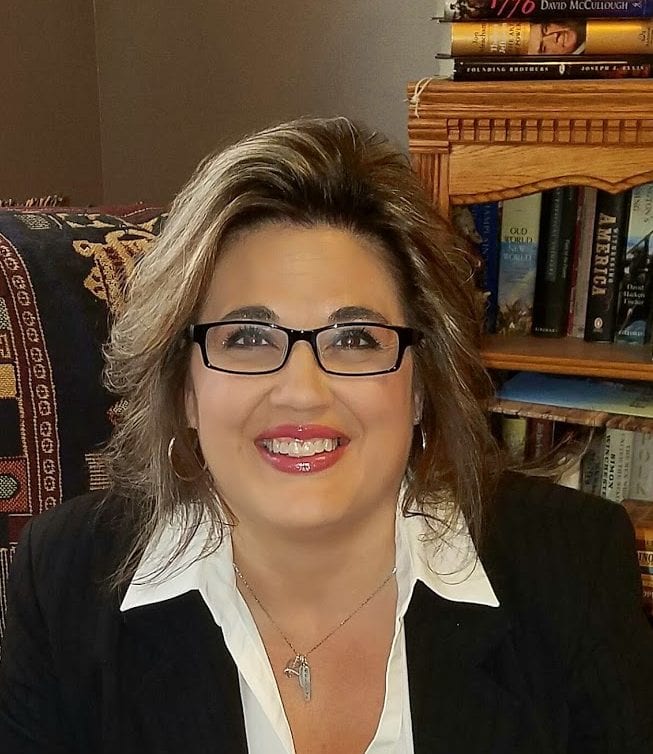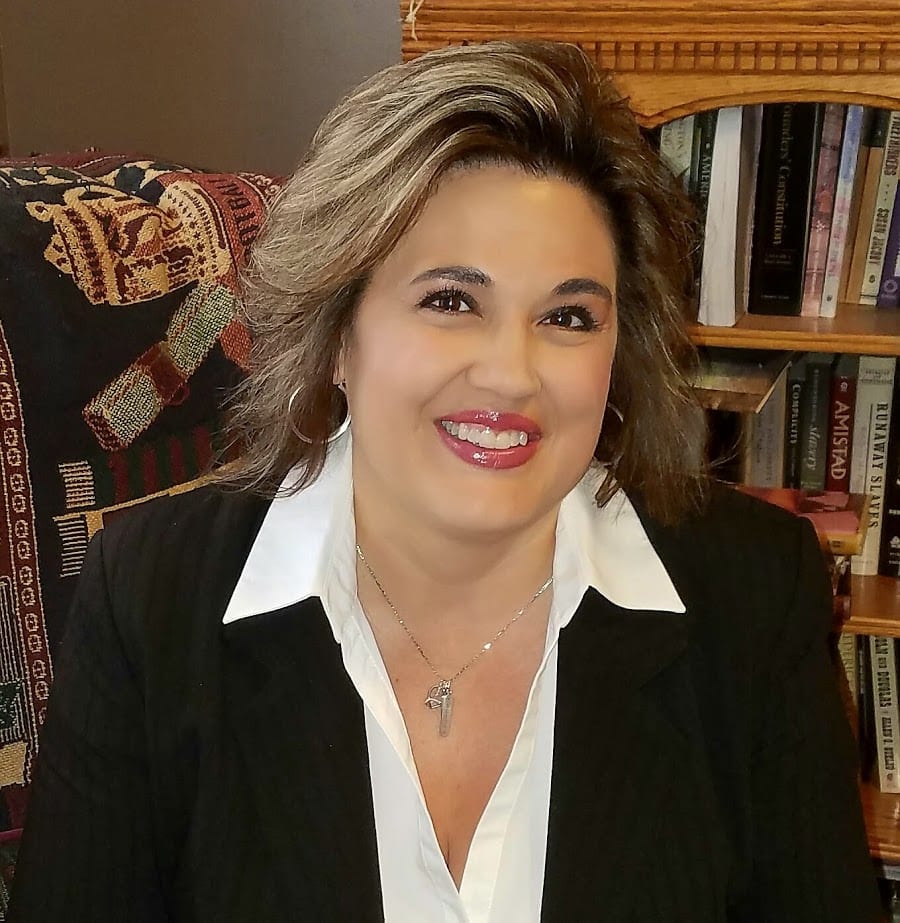Meet Our Teachers
Donna Devlin

A Teacher’s Intellectual Transformation
TAH.org’s Master of Arts in American History and Government (MAHG) aims to give secondary school teachers a broad and thorough grounding in American history and government, so that they may help junior and high school youth understand the requirements of self-government. Teachers in the program read primary documents from all eras of American history and engage in thoughtful conversation about the political principles of the founders and the difficulties earlier generations faced in trying to realize those principles. Most teachers find the work challenging yet become deeply engaged in it. Excited by what they learn, they carry this excitement back to their classrooms. Occasionally, a MAHG student grows so interested in the work that they embark on PhD studies.
Donna Devlin, challenged by the opportunity to expand her intellectual reach, entered the MAHG program in 2008. She planned to take two summer courses and then decide whether to continue. It would mean spending several weeks of successive summers in Ohio, away from her family. As it turned out, those first two courses would eventually lead to a new career goal.
A Masters Program that Leads to the Wider World
Devlin lives in the geographical center of the 48 contiguous states—Smith Center, Kansas. The town lies close to the Nebraska border, at about the midpoint of the ten-hour drive between Kansas City and Denver. Devlin grew up in the town, which is surrounded by small family farms slowly giving way to larger agricultural enterprises. Prior to her MAHG work, Devlin says, she had experienced very little of life outside the American Midwest.
Having gone back to school as an adult, Devlin graduated from Fort Hays State University in 2006 with a bachelor’s degree in history and secondary education. She immediately took a job at Smith Center High School. The small, rural school serves about 600 students, in all the grades from kindergarten through high school. Devlin covered social studies instruction for four grade levels—the 10th, 11th, and 12th, along with either a 7th or 8th grade history course.
Her schedule allowed no time for study during the school year, but MAHG offered one-week intensive summer courses. Devlin found the professors genuinely interested in the intellectual insights of teachers, while administrators in the program took care of teachers’ practical needs.

In the summer of 2009, she was chosen to represent Kansas in another TAH.org teacher program, the three-week Presidential Academy, which took teachers to Philadelphia, Gettysburg and Washington, DC to study critical moments in US history: the Founding, the Civil War, and the Civil Rights movement. The seminar drew the connections between these three moments. All tested the capacity of American society and government to live up to the claims in the Declaration of Independence for human equality and the rights to life, liberty, and the pursuit of happiness.
“This program changed my life and my whole perspective on American history and government,” Devlin said. “It gave me a stack of new primary sources I could take back to my classroom. It also helped me see the wider world.”
Visiting the Atlantic states and the sites of earlier American history heightened Devlin’s awareness of the larger national story. Meeting social studies teachers from across the country broadened her understanding of it. Now, “I realized I needed to be quiet and listen to other teachers. They knew things I didn’t and brought perspectives from their own states. I matched my own understanding against theirs. The world starts to make more sense if you can get out of your own mind and listen to somebody else.”
In 2010, she was awarded a fellowship from the James Madison Foundation that funded her MAHG degree and included four weeks of study at Georgetown University. With the help of her thesis advisor, Dr. Dan Monroe of Millikin University in Illinois, she completed her degree in 2012. Her thesis, “James Henry Lane: Popular Sovereignty Advocate for Territorial Kansas,” discussed a leader among those advocating the admission of Kansas to the Union as a “free soil” state.
By this time, Devlin was the only teacher at Smith Center High School with a history and government specialization, teaching 120 to 130 students a day. She did what had to be done to educate the community’s children. Yet she missed interacting with other highly motivated students and teachers of American history and government. Being “the lone instructor teaching about the meaning of America was difficult,” she said.
In 2016, Devlin explored a PhD program offered at the University of Nebraska-Lincoln. She met a professor of Nineteenth-Century Studies (a field combining history, literature, and other disciplines) and American legal history who offered to advise her on an independent summer research project in the legal history of the United States. Dr. Katrina Jagodinsky, author of Legal Codes and Talking Trees: Indigenous Women’s Sovereignty in the Sonoran and Puget Sound Borderlands, 1854–1946, researches the experience of Native American women from a legal perspective.
Devlin found Jagodinsky’s approach fascinating, and the professor found Devlin very capable. With Jagodinsky’s help, Devlin secured funding for the doctoral program and began full-time studies in 2017. With the generous support of the UNL History Department, Devlin is advancing toward her doctorate while keeping her time away from home to a minimum. She drives the three hours to Lincoln on Tuesday mornings, usually returning on Thursday evenings.
Encouraged by Jagodinsky, Devlin secured a fellowship with the Center for Great Plains Studies, giving her an affiliation with a network of scholars in her field. She’s considering dissertation topics that bring a legal lens to Great Plains History. Picking up on her MAHG thesis work, she may investigate legal issues in the settling of the Kansas territory. Between 1854 and 1856, eager settlers streamed into the territory ahead of any organized federal administration. “They didn’t have an actual federal land office until mid-1856,” Devlin explains. Land was divided as squatters claimed it, and in the contest between those who wanted Kansas to admit slavery and those intent on preventing this, violence erupted over competing claims and survey errors. “One can easily argue that the Civil War started in Kansas,” Devlin said.
She uncovered another possible dissertation topic during an internship last summer with the Willa Cather Foundation in nearby Red Cloud, Nebraska. She began looking into the ways women settlers in the West dealt with sexual violence “in a judicial setting that was less than cordial to their interests. It’s not a subject that has been studied much.” Devlin has found that statutory laws and case law developing precedent in these matters in the late-nineteenth century illuminate important aspects of women’s experience during the settlement of the West.
Devlin has written an essay on this topic that will be published soon in the Willa Cather Review. She will also present her research at a conference of the 19th Century Studies Association in Kansas City in March.
Excited about her discoveries, Devlin says, “I would never have thought my current work possible if the MAHG program and the professors there had not given me the confidence and knowledge to move forward.”
